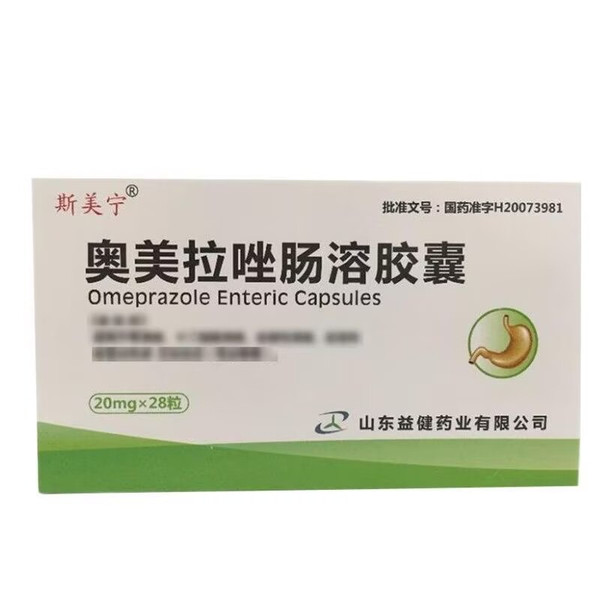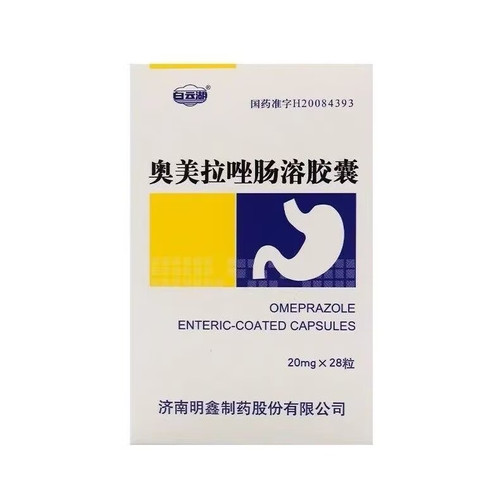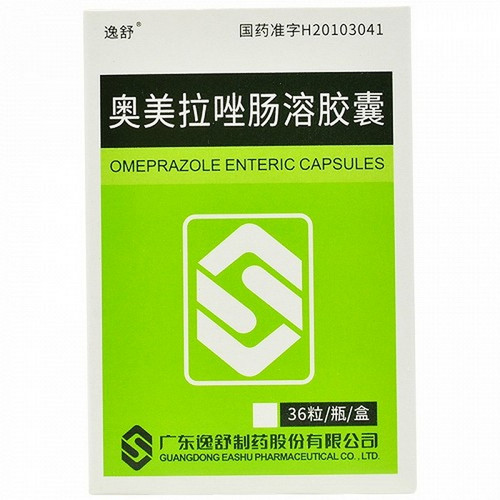Product Overview
[Drug Name]
Generic Name: Omeprazole Enteric-Coated Capsules
Trade Name: SiMeining Omeprazole Enteric-Coated Capsules 20mg*28 Capsules
Pinyin Full Code: SiMeiNing AoMeiLaZuoChangRongJiaoNang 20mg*28Li
[Main Ingredients]
The main ingredient of this product is omeprazole.
[Indications/Main Functions]
This product is used for the short-term relief of heartburn and acid reflux symptoms caused by excessive gastric acid.
[Specifications]
20mg*28 Capsules
[Dosage and Administration]
Oral. Adults: 1 capsule once daily (every 24 hours). Take an additional capsule as needed with warm water. This product must be swallowed whole. Do not chew or crush it. Do not crush it in food.
[Adverse Reactions]
Common adverse reactions to this product include headache, diarrhea, nausea, vomiting, constipation, abdominal pain, and bloating. Occasionally, dizziness, drowsiness, fatigue, sleep disturbances, paresthesias, rash, itching, urticaria, and abnormal liver function tests may occur. Rarely, hyperhidrosis, peripheral angioedema, hyponatremia; angioedema, fever, and anaphylactic shock; leukopenia, thrombocytopenia, granulocytosis, and pancytopenia; reversible confusion, irritability, depression, aggression, and hallucinations; gynecomastia; dry mouth, dysgeusia, stomatitis, and candidiasis; alopecia, photosensitivity, and erythema multiforme; hepatic encephalopathy (in patients with preexisting severe liver disease), icteric or non-icteric hepatitis, and liver failure; bronchospasm; arthralgia, myalgia, and muscle fatigue; interstitial nephritis; and blurred vision.
[Contraindications]
This product is contraindicated in patients with allergies, severe renal impairment, and infants and young children.
[Drug Interactions]
1. Avoid concomitant use with oral imidazole antifungals such as ketoconazole, itraconazole, miconazole, and fluconazole. 2. Concomitant use of omeprazole and clarithromycin may increase the incidence of central nervous system (primarily headache) and gastrointestinal adverse reactions. 3. Avoid concomitant use with diazepam (Valium), phenytoin, warfarin, nifedipine, digoxin, cisapride, quinidine, cyclosporine, caffeine, and theophylline. 4. Concomitant use with other medications may cause drug interactions. Please consult a physician or pharmacist for details.
[Precautions]
1. Do not use for more than 7 days. If symptoms persist or disappear, consult a physician or pharmacist. 2. Do not re-use within 2 months. If symptoms recur, seek medical attention immediately. 3. Do not use this product in the following circumstances: difficulty or pain swallowing; vomiting blood; or bloody or melena. These may be signs of a serious condition; consult a physician. 4. Patients with impaired liver function or abnormal blood counts should use this product under the guidance of a physician. 5. If heartburn persists or worsens, discontinue use of this product and seek medical attention. 6. This product should only be used by children under the supervision of a physician. 7. Use with caution during pregnancy or lactation. 8. In case of overdose or serious adverse reactions, seek medical attention immediately. 9. Do not use if you are allergic to this product. Use with caution if you have allergies. 10. Do not use if this product changes its properties. 11. Keep this product out of reach of children. 12. Children must be supervised by an adult before use. 13. If you are currently using other medications, consult a physician or pharmacist before using this product.
[Pharmacology and Toxicology]
Proton pump inhibitor. This product is a lipid-soluble, weakly alkaline drug that is easily concentrated in acidic environments. Therefore, after oral administration, it is specifically distributed in the secretory tubules of the gastric mucosal parietal cells, where it is converted to its active form, the sulfenamide, in this highly acidic environment. It then irreversibly binds to the residues of the H+, K+-ATPase (also known as the proton pump) in the secretory membrane of gastric cells via a monosulfide bond, forming a complex of sulfenamide and the proton pump. This inhibits the activity of the enzyme and blocks the final step of gastric acid secretion. Therefore, this product has a strong and lasting inhibitory effect on gastric acid secretion caused by various reasons.









